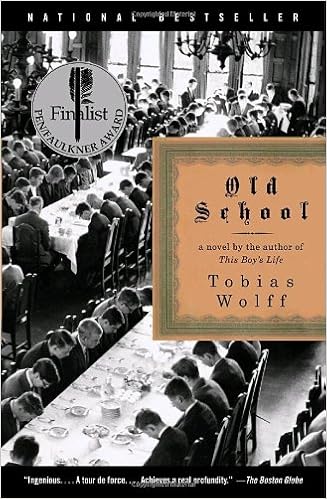 Old School
Old Schoolby Tobias Wolff
reviewed by Lauren Bolte
Old School by Tobias Wolff, a compelling literary fiction novel, describes the reality for boys attending an esteemed boarding school in the 1960s through the eyes of an observant and bright narrator. The school, well known for its writing and literary programs, pushes the students to devote their lives to becoming scholarly and attentive young men. Every couple of months, the school board invites a respected author to read through works that students submit as if they are entering a raffle. The author chooses the piece that they think deserves recognition, and the winner receives an audience with the renowned composer. This creates an extremely competitive environment for the talented students, leading to personal and communal conflict. Only one lucky boy will win the opportunity of a lifetime.
The narrator, a gifted student and writer, is attending the school on scholarship. He is expected to do well in all classes and succeed in his career as a writer. However, his roommate, Bill White, is in the same boat. The tensions build as authors such as Robert Frost and Ayn Rand speak at the school, but when it is announced that Ernest Hemingway is visiting, everyone is out for blood. The boys are forced to test the limits of loyalty, friendship, and creativity. As the reader, we are taken with the narrator through his experiences with writer’s block, unsupportive friends, and social drama. Most of the board members and teachers at the school are ruthless with their criticism, but some can relate with the boys and show preference for the ones that have true writing potential. The narrator’s supporters include Dean Makepeace and Robert Ramsey, two men with a lot of power at the school. The assist him through tough times with his work and other students. Although their help is not always direct, the narrator knows that they are the only ones he can trust at the cutthroat school. The visiting authors are not always what they seem through their work, and the narrator learns that writing changes with the writer, instead of the other way around. When his life takes a turn for the worst, he realizes that people see may see things very differently than you may think, and this can heavily affect your lifestyle. Tobias Wolff, the author, does an astonishing job of creating a visible connection between the characters and their very different perspectives of the world around them.
Imagery is a very vital device in the writing of a novel. The reader needs to be able to visualize the characters and setting in order to truly understand the meaning of the story. Tobias Wolff establishes a strong plot and emphasizes the crucial details with imagery and metaphors. He describes the setting of the school’s lawns as “a rich, unreal green against the muddy brown expanse of surrounding farmland….The chapel with its tall crenellated bell tower and streaming pennant looked like an engraving in a child’s book” (p.134). His creative storytelling allows the reader to feel as if they are truly in the novel with the characters. Tobias Wolff also has a way of leaving the reader hanging at the end of each chapter, like the end of a dramatic movie. It helps you to really think about the meaning of the chapter and how it will play out in the next one. At the end of chapter three, he describes the narrator’s experience in the library and ends with the following sentence: “I roe from my deep chair and crossed the room past boys dozing over books and exchanged the K volume for B” (p. 60). We are left wondering why he did this, and what it means for the rest of the book.
I would definitely recommend this book to readers that are looking for an enjoyable, yet thought-provoking novel. The genre is close to historical fiction, and it written to seem as if it is an autobiography. I thoroughly enjoyed reading Old School, and the author’s writing technique allowed me to connect the points covered throughout the book. Overall, it is a very captivating novel.
No comments:
Post a Comment